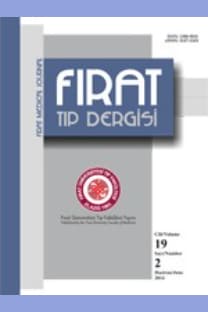Gebelikte Gözlenen Deri Değişiklikleri ve Gebelik Dermatozlarının İncelenmesi
Gebelik, Cilt bulguları, Dermatoz
Skin Changes Seem in Pregnancy and Analysis of the Dermatoses of Pregnancy
-,
___
- 1. Lewley TJ, Yancey KB. Skin changes and diseases in pregnancy. In: Fitzpatrick TB, Eisen AZ, Wolf K (Editors). Dermatology in general medicine. Fourth edition, New York; Mc Graw-Hill Book Company 1993: 2105-2112.
- 2. Cantürk T, Önel E, Üstün C. Gebelik ve deri. Ondokuz Mayıs Üniversitesi Tıp Dergisi 1999; 16: 258-267.
- 3. Polat M, Dönmez ME. Gebelik dermatozları. Türk Jinekoloji ve Obstetrik Derneği Dergisi 2008; 4: 241-247.
- 4. McLean MA, Wilson R, Thompson JA, Krishnamurthy S, Walker JJ. Immunological changes in early pregnancy. Eur J Obstet Gynaecol Reprod Biol 1992; 43: 67-72.
- 5. Stern K, Davidsohn I. Effect of estrogen and cortisone on immune hemoantibodies in mice of inbred strains. J Immunol 1955; 74: 479-484.
- 6. Pence B, Kundakçı N, Avşar F. Gebelerde deri değişiklikleri ve dermatozların incelenmesi. T Klin Dermatoloji 1994; 4: 81- 86.
- 7. Özdemir M, Özdemir S. Gebelikten etkilenen deri hastalıkları. Dermatose 2006; 5: 163-168.
- 8. Muzaffar F, Hussain I, Haroon TS. Physiologic skin changes during pregnancy: A study of 140 cases. Int J Dermatol 1998; 37: 429-431.
- 9. Kumari R, Jaisankar TJ, Mohan D, Thappa A. Clinical study of skin changes in pregnancy. Indian J Dermatol Venereol Leprol 2007; 73: 141.
- 10. Chang AL, Agredano YZ, Kimball AB. Risk factors associated with striae gravidarum. J Am Acad Dermatol 2004; 51: 881-885.
- 11. Wong RC, Ellis CN. Physiologic changes in pregnancy. J Am Acad Dermatol 1984; 10: 929-940.
- 12. Shivakumar V, Madhavamurthy P. Skin in pregnancy. Indian J Dermatol Venereol Leprol 1999; 65: 23-25.
- 13. Özdemir M, Özdemir S. Gebelikte görülen fizyolojik deri değişiklikleri. Dermatose 2006; 5: 22-25.
- 14. Coşkun B, Öztürk P, Çiçek D. Gebelik dermatozları. Dermatose 2004; 3: 72-76.
- ISSN: 1300-9818
- Başlangıç: 2015
- Yayıncı: Fırat Üniversitesi Tıp Fakültesi
Baha ZENGEL, Ahmet ALACACIOGLU, Ayse YAGCI, Hakan POSTACI, Ozgur KAVAK, Ali GALİP, Erhan GOKMEN
Kolda Nervus Medianus'un Bir Oluşum Varyasyonu
Zeliha FAZLIOĞULLARI, Mahinur ULUSOY, Nadire Ünver DOĞAN, Mehmet Tuğrul YILMAZ, Ahmet Kağan KARABULUT
Baş ve Boyun Tümörlerinde Positron Emisyon Tomografi/Bilgisayarlı Tomografi (PET/BT)
Zehra Pınar KOÇ, Tansel Ansal BALCI
Retina Ven Dal Tıkanıklığına Bağlı Maküla Ödeminde Primer Intravitreal Bevakizumab Enjeksiyonu
Ahmet YALÇIN, Yasin Yücel BUCAK, Ahmet Şahap KÜKNER, Didem SERİN, Sedat ÖZMEN
Lisinopril, Sildenafil ve Birlikte Kullanımlarının Karın İçi Yapışıklık Oluşmasını Önleyici Etkileri
Cüneyt KIRKIL, Serdar COŞKUN, Nurullah BÜLBÜLLER, Erhan AYGEN, Koray KARABULUT
Hamstring Tendon Otogrefti ile Ön Çapraz Bağ Rekonstrüksiyonu
Sancar SERBEST, Hacı Bayram TOSUN, Erhan YILMAZ
Gebelikte Gözlenen Deri Değişiklikleri ve Gebelik Dermatozlarının İncelenmesi
Selma BAKAR DERTLİOĞLU, Demet ÇİÇEK, Haydar UÇAK, Hüsnü ÇELİK, Nurhan HALİSDEMİR
